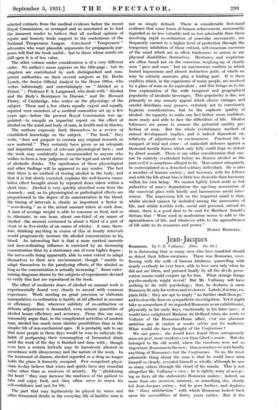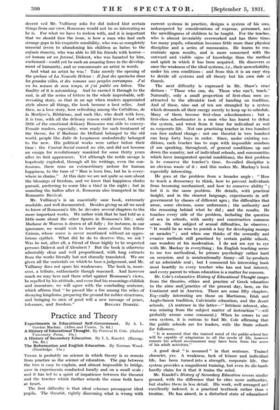Jean-Jacques
Rousseau. By C. E. Vuffiamy. (Bles. 10s. 6c1.)
IT is distressing that so many men who love mankind should so detest their fellow-creatures. There was Rousseau, over- flowing with the milk of human kindness, quarrelling with nearly everbody he ever knew, able to love men only when he did not see them, and pursued finally by all the devils perse- cution mania could conjure up for him. What strange things psycho-analysis might reveal ! But Mr. Vulliamy will have nothing to do with psychology ; that, he declares, is mere flummery fit only for writers and reviewers. Labels, it is true, ex- plain little ; they are apt to imply " no further shalt thou go," and to close the door on sympathetic investigation. Yet it might take us somewhere if we regarded Rousseau as an exhibitionist, physically in his early days, emotionally in his later ones ; it would have enlightend Madame du Deffand when she wrote to Voltaire of the Rousseau-Hume affair, c'est une plaisante ambition que vouloir se rendre celebre par les malheurs. What would she have thought of the Confessions ?
We can guess : she would have found them outrageously mauvais gcdt, more strident even than Gluck's music. But she belonged to the old world, where the emotions were not so important, Rousseau to the new; thus nowadays we read hardly anything of Rousseau's but the Confessions. To us, the most admirable thing about the man is that he could have seen himself so clearly, revealed himself so wholly, although he saw so many others through the cloud of his mania. This is not altogether Mr. Vulliamy's view ; he is rightly wary of acccp1:- iag as facts all the statements Rousseau makes ; indeed, on more than one occasion, memory, or something else, clearly led Jean-Jacques astray ; but he goes further, and deplores the slimy satisfaction " with which Rousseau looked back upon his peccadilloes of thirty years earlier. But if the
decent veil Mr. Vulliamy asks for did indeed blot certain things from our view, Rousseau would not be so interesting as he is. For what we have to reckon with, and it is important that we should face the issue, is how a man who had such strange gaps in his exquisite sensibility, who was so completely unsocial (even to abandoning his children as babes to the enfants trouvis), who was able to fill his friends with honor- ed homme est an forcene, Diderot, who was haunted by him, exclaimed—could yet be such an amazing force in the develop- ment of humanity, and so consummate an artist in words.
And what an artist he was ! Take merely the opening of the preface of La Nouvelle Hdloise : B faut des spectacles dans les grandes vines, et des romans aux peuples corrumpus.
vu les wears de mon temps, et j'ai public ces lettres. The finality of it is astonishing. And he carried it through to the end, in all the series of letters in the whole improbable, self- revealing story, so that in an age when readers appreciated style above all things, the book became a best seller. And then, as a love story, how refreshing among the Crebillons, de in Morliere's, Bibbienas, and such like, who dealt with love, it is true, with all the delicacy reason could invent, but with little of the emotional delicacy Rousseau was able to convey- Female readers, especially, were ready for such treatment of the theme, for if Madame du Deffand belonged to the old world, people like Julie de Lespinasse undoubtedly belonged to the new. His political works were rather before their time ; the Conlrat Social caused no stir, and did not become an ensign for revolutionary mankind for some thirty years after its first appearance. Yet although the noble savage is hopelessly exploded, through all his writings, even the con- fessions, there runs an extraordinary ardour for human happiness, to the tune of " Man is born free, but he is every- where in chains." At this date we are not quite so sure about the blessings of freedom, and we know that happiness eludes pursuit, preferring to come like a thief in the night ; but in sounding the halloo after it, Rousseau also trumpeted in the Romantic Revival.
Mr. Vulliamy's is an essentially sane book, extremely readable, and well documented. Besides giving us all we need to know of Rousseau's life, he devotes several chapters to the more important works. We rather wish that he had told us a little more about the other figures in Rousseau's life ; only Madame de Warens is drawn at all fully ; for instance, in our ignorance, we would wish to know more about this fellow Grimm, whose name is never mentioned without an oppro- brious epithet. What did he do to deserve this, we ask ? Was he not, after all, a friend of those highly to be respected persons Diderot and d'Alembert ? But the book is otherwise admirably clear and well proportioned, with long extracts from the works literally but not clumsily translated. We are given all the materials on which to base a judgement, and Mr. Vulliamy does not spare his weaknesses. The book is, more- over, a tribute, enthusiastic though reasoned. And however much we may here and there rebel against Rousseau's views, be repelled by his attitude, and even find his reasonings childish and immature, we will agree with the concluding sentence, which affirms that " he passed like a fire among the relics of decaying kingdoms, preparing the ground for nobler structures, and bringing to men of good will a new message of peace,































 Previous page
Previous page